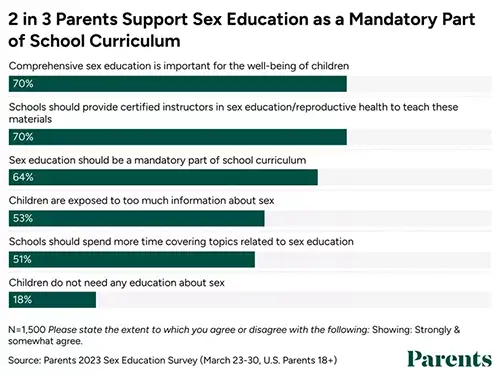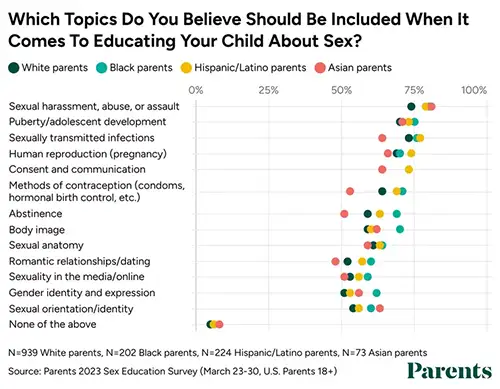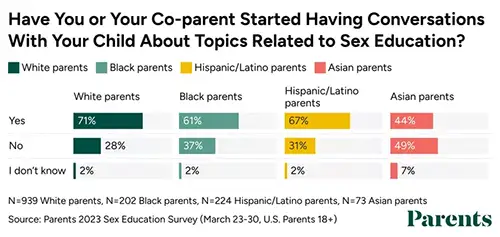Education
Most Parents Say Sex Education Needs Improvement

Why Sex Education Needs Improvement: A Call for Comprehensive Reform
Sex education plays a vital role in children’s development, but increasing evidence suggests sex education needs improvement across the United States. Despite restrictive legislation in many states, most parents still support comprehensive sex education for their kids.
Rising Concerns Around Current Sex Education Policies
Lawmakers across multiple states passed strict laws targeting curriculum around gender and sexuality over the past few years. Perhaps the most notable example is Florida’s “Don’t Say Gay” law, which restricts discussions from kindergarten through 12th grade.
However, the Parents 2023 Sex Education Survey reveals that this legislation does not align with what most parents want. An overwhelming majority support more inclusive, informative, and supportive programs at school.
Parents Strongly Support Sex Education in Schools

According to the survey, 70% of parents believe comprehensive sex education is essential to a child’s well-being. Three in four parents ranked sex education as important or very important.
These opinions align with findings from the American Academy of Pediatrics (AAP), which states healthy sexuality is a crucial developmental milestone for every child.
Additionally, researchers link insufficient education to high college sexual assault rates, reinforcing that sex education needs improvement nationwide.
What Parents Want From Sex Education Programs
Parents in the survey emphasized the need for education on consent, relationships, gender identity, and sexual harassment. These concerns reflect real-world risks that affect teens across all backgrounds.
Unfortunately, many schools offer abstinence-only curriculums, and only 13 states require medically accurate information. This serious gap confirms why sex education needs improvement.
Parents Demand Comprehensive, Inclusive Lessons

Experts define comprehensive sex education as covering topics like healthy relationships, sexual development, intimacy, and gender identity. This approach helps children with or without disabilities and prepares them for real-life challenges.
Melissa Pintor Carnagey, author of “Sex Positive Talks to Have With Kids,” points out that schools teach complex math but ignore vital life skills. She insists that today’s sex education needs improvement urgently.
Parents Take the Lead on Sex Conversations at Home

Survey results show that 85% of parents plan to talk about sex with their kids. Sixty-seven percent already started the conversation. Yet many admit delaying these talks due to age uncertainty.
Half of parents intend to begin discussions by age 13, although research suggests children benefit more when learning begins much earlier.
Social Media and Pornography Drive Urgent Conversations
Many parents worry that their kids learn about sex from social media and pornography. In fact, 54% of children view pornography before age 13.
Given these numbers, early conversations with parents are more critical than ever. This alarming reality is another reason sex education needs improvement.
Good Sex Education Delays Early Sexual Activity
Contrary to popular belief, studies reveal that informed children delay sexual activity. They also use contraception more consistently and make smarter choices.
Additionally, open conversations about gender build safer spaces for LGBTQ youth. This support is vital, given the increased mental health risks in that community.
How to Talk to Your Kids About Sex
Many parents feel unsure about how to start. Experts recommend using age-appropriate language, answering questions honestly, and creating a safe communication environment.
Starting simple helps. One educator explains how she uses imaginary “bubbles” to teach young children about bodily autonomy and consent.
Helpful Communication Tips for Parents
- Use simple, clear language children can understand.
- Respond positively to questions, no matter how awkward they may feel.
- Encourage children to explore answers with you if you don’t know.
- Remain open, calm, and nonjudgmental during conversations.
- Keep the door open for future discussions about relationships and identity.
Positive Support Improves Mental Health
The American Academy of Pediatrics emphasizes the health benefits of loving, affirming environments for all children, regardless of gender or sexuality. When parents provide reassurance, children grow more confident and resilient.
Resources Parents Can Use To Improve Sex Education at Home
Survey respondents recommend parenting websites, health education platforms, doctors, books, and peer networks as resources. These tools help bridge the education gap that currently exists in many school systems.
Honesty Builds Trust and Lifelong Learning
If you don’t know an answer, say so. Honest communication builds trust. Show your children that learning about relationships is a continuous journey.
As one parent shared, honesty ensures children will keep coming back with questions. This ongoing connection reinforces healthy decision-making throughout their lives.
Final Thoughts: The Path Forward for American Sex Education
Comprehensive, inclusive sex education empowers children to make safe, informed decisions. As our cultural landscape evolves, so should our curriculums.
Clearly, ex education needs improvement in scope, delivery, and content. Policies must reflect both expert recommendations and the needs of real families.
Why We Must Act Now
The evidence is overwhelming: children face misinformation, risks, and pressures daily. Schools and parents must respond with meaningful, accurate, and timely education.
Sex education needs improvement, and we must act now to ensure all kids grow into confident, informed adults.
Stay informed and take action. Explore more family, parenting, and education news on this website today.












